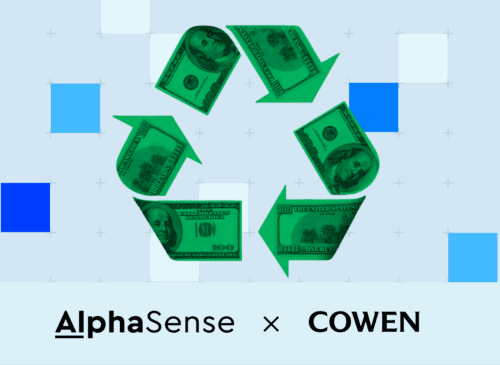Anti-ESG sentiment is rapidly becoming more prevalent. In the AlphaSense platform alone, documentation around “ESG backlash” is up 240.25%, and many investors are unsure whom they can trust. In this article, we will consider the key trends in the ESG movement, as well as the issues that have arisen as a result of it.
The U.N’s intentions for ESG investing have always been altruistic: to influence the mainstream finance industry into funneling private capital to address global challenges. This trend of surveying companies and their commitment to upholding environmental, social and governance policies in their day-to-day operations has existed since the ‘60s, yet it’s one that has gained traction with today’s investors.
In an age where environmental and ethical travesties are shown in the media on a near-constant basis, investors are becoming more conscious of how companies, and their own investments, potentially play a part.
As the number of investors who put their capital into highly-rated ESG companies and away from those which pollute, pay bribes, or mistreat workers rises, the market is responding accordingly. An article from Deloitte stated that “in the United States, fund managers launched 149 mutual funds and ETFs with ESG characteristics or objectives in 2021, comprising about 22% of all fund launches. The one-year growth rate of ESG fund launches in the United States is more than twice that of funds without, 80% versus 34%, respectively.”
But this upward trend has introduced a number of issues. Recently, a cohort of companies have claimed to uphold ESG standards, but without any institutional means of measuring and reporting their commitments, there’s no way to validate their claims. In fact, recent investigations into Goldman Sachs and Deutsche Bank for their ESG claims have led to speculations of fund managers relabeling their products in an attempt to cash in on the trend without doing any of the heavy lifting.
This debacle has spurred the rise of widespread ESG backlash that we are seeing now.
Related Reading: 5 Steps to Building an Effective ESG Strategy
Evaluating Intentions
Prior to these investigations and growing concerns from the Securities and Exchange Commision (SEC) and International Sustainability Standards Board (ISSB), companies were less concerned with sharing accurate representations of their ESG commitments. In the race to outperform competitors and up their stock value, some even proposed reformative plans with unrealistic goals and falsified records to mislead investors, improve their ESG rating, and drive investments. This sort of market manipulation has caused investors to dig deeper into the tactics behind greenwashing.
Last year, S&P produced a webinar called, The Future of ESG Intelligence: Tackling Data Availability Gaps, where the conversation focused on a future without greenwashing. While experts recognize that this possibility is completely dependent on the information a company releases and how they chose to portray such information, there’s still opportunity to discern the authenticity of their promises.
“Looking at real-world outcomes is probably the best way to prevent greenwashing,” Manjit Jus, Managing Director & Global Head of ESG Research, says. “So looking at [a company’s ESG] policy alone would give you one view and then looking at the real-world outcomes…that’s where an alternative data set comes in. So if you’re looking at climate policies or net zero commitments, that’s one thing…But if you’re not looking at like the actual data around trajectories and whether it’s actually realistic that these companies or industries can even meet these targets that are being set, that can help inform your overall assessment of a company and gives you an indication of misalignment with what a company is saying in their reports versus what actually happened or will happen.”
Even investment banking services like BNY Mellon Investment Adviser are misleading investors to their advantage. There’s been an uptick of investment advisers and funds selling investments that incorporate ESG strategies or criteria central to the concept to meet growing investor demand.
However, in the case of BNY Mellon, evidence was found that its advisers did not perform the ESG quality review that it disclosed using as part of its investment selection process for certain mutual funds it advised, costing BNY Mellon a $1.5 million penalty from the SEC. The bottom line is the importance in performing due diligence on a company’s ESG policies and its accompanying trajectories in order to make strong investment decisions.
The Need for Transparency
With the penalization of BNY Mellon, corporate authenticity and punishment for misleading investment tactics has brought attention to industry greenwashing and increased ESG backlash. However, corporations and funds are also manipulating public perception regarding their ESG initiatives with their lack of transparency within company documentation and reports.
“We do know that funds have the ability to present data in a simple way that regular people can understand,” Gita R. Roa, a Senior Lecturer in Finance at MIT Sloan, says. “But it’s not being done that way. It’s being buried, and it makes it very difficult for us as shareholders to understand what actually funds are doing. So pushing for transparency and pushing for disclosure is critical.”
Today, it’s not enough for corporations to simply publish ESG reports and set arbitrary sustainability goals. With greenhouse gas emissions, greenwashing, and stakeholder activism on the rise, corporate boards are being scrutinized more than ever with evolving global regulations and tightening reporting frameworks.
So what are the investment implications of these massive changes? And with these new ESG frameworks, how are companies positioning themselves? We answer these questions and more in a special webcast, A Cowen Exclusive: The Biggest ESG Trends and Predictions for 2022, featuring Cowen, named “Best ESG Research” at the ESG Investing Awards in 2022.






